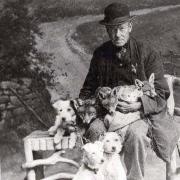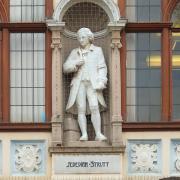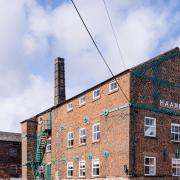David Marley chats to the Derby County icon Colin Todd about his playing time at the club and discusses life outside the game following his retirement. Photographs by Sarah Marley

‘I REALLY do believe that if Brian Clough had stayed with Derby for just a bit longer, we could have gone on to win so many more football league titles and perhaps even a few European trophies too,’ contemplates the former Derby County star Colin Todd.
Todd, who played over 370 competitive first-team matches for the Rams between 1971 and 1978, is in reflective mood, having just made the decision to hang up his football boots and manager’s coat for the last time, bringing to an end a football career spanning almost five decades.
As one of the most gifted defenders of his generation, who then went on to enjoy considerable success with many other clubs as a player, coach and manager, Todd is still quick to acknowledge that the time he spent at Derby County during the 1970s was the high point of his life in football. ‘Without a doubt, the best years of my career were spent here in Derby – and those under the leadership of Brian Clough rank also as some of the most happy in my life,’ he grins. ‘It truly was a golden age of football and it was a joy to spend it in one of the most friendly places in the whole of the country.’
Clough’s visionary, and sometimes unorthodox, approach of creating and building match-winning teams clearly had a major impact on Todd’s playing career – as well as his journey into football management in later life. ‘Brian was a great man; a type I don’t think we will ever see the likes of again,’ he says.
Colin Todd’s record in football is impressive in his own right. He has experienced success at every level of the footballing pyramid, benefiting from a remarkably long-lasting professional career. He made over 600 appearances in the English football league, playing for Sunderland, Derby County, Everton, Birmingham City, Nottingham Forest and Oxford United before retiring after a brief spell with Luton Town.
Awards and accolades were netted with ease during his time with his beloved team. He scooped two football league titles with Derby County and won the Professional Football Players’ Player of the Year Award in 1975. He was also capped by England on 27 occasions between 1972 and 1977.
As a coach and manager he took charge of Middlesborough, Bolton Wanderers, Swindon Town, Derby County, Bradford City, Darlington and the Danish sides Randers FC and Esbjerg.
Todd’s natural footballing ability acted as a perfect foundation for a future role in management. He secured promotion with many of the teams he led, putting together a high-profile championship-winning team at Bolton Wanderers, as well as achieving manager-of-the-month accolades and a Wembley-cup-final team appearance during his 1,000-plus games in charge as a manager.

Over the past half a century in football he has been involved in over 1,700 first-team matches and he remains as popular as ever in the football community.
He has a unique ability to spot talented players and get the best out of those around him. Whilst at Derby County he was known as the ‘thinking-man’s defender’ for his much-in-demand proficiency of reading the flow and pattern of the game. Even today his technical knowledge is unrivalled and his opinions are much valued.
But back in the mid-1960s Colin Todd was a young footballer, finding his way in a game he had come to love as a boy growing up in the mining communities of the North East of England. ‘Football and sport were important to all young boys growing up in the North East. As a youngster I played football morning until night – often with a tennis ball in the back alleys of where I grew up,’ he says. ‘I had already broken into the first team at Sunderland at the age of 17.
‘My wife Jennifer and my eldest son were living in a club bungalow, when one evening my manager, Alan Brown, telephoned to say he wanted me to visit him and have a chat with someone special,’ he explains. ‘I got in my car and drove to Alan’s house to be greeted by Brian Clough – one of the last people I expected to meet that evening,’ Colin laughs. ‘I had played under Brian before when he was my youth team manager at Sunderland, so I knew a bit of how he operated and what made him tick.’
‘We never really chatted about what I hoped for – he just shared his dreams for Derby County and said he wanted me to be part of it. I trusted his vision and I arrived home to tell Jennifer to pack a bag as we were moving to Derby – and she was great about it.’
Arriving in Derby in January 1971, Todd was impressed to see how much it resembled his native North East. ‘There were loads of people on bikes coming out of factories and businesses such as Rolls-Royce – it was just like the back streets of Chester-le-Street where I grew up,’ he smiles.
Travelling on to the Baseball Ground he was welcomed by Brian Clough and his assistant Peter Taylor. ‘I was asked to sign on the dotted line and that was that,’ he chuckles. ‘Jen was driven up to the Midland Hotel in Derby, and I was told to get ready for a match in Blackpool the next day.’
Confined to the dugout for the Blackpool match as he had signed too late to play under the Football Association rules, Todd realised that by coming to Derby County for a reported £175,000 fee he had smashed the British transfer-signing record. ‘There were a few raised eyebrows in the town at the time,’ he says.

‘Rolls-Royce was making people redundant and for some work was hard to come by – so the transfer fee seemed an awful lot of money to many people.’
‘What surprised me at the time was that Brian had just driven to Sunderland to sign me without first agreeing it with the club’s chairman, Sam Longson,’ Todd remarks. ‘But that was just part of the character of the manager – he really was the most inspiring and passionate man I have ever known in football.’
In his first match, at home to Arsenal, he was switched to the right-back defensive position. ‘Dave Mackay was still in the team then, so I had to adjust to a new place,’ he explains. ‘But it was soon clear that Brian had brought me in to replace Dave, which was typical of the great manager – he was always planning for the future.’
Life in their adopted county was good for the Todds – and they quickly settled in and made new friends by exploring the town. ‘We bought a new-build property in Littleover – and one of our neighbours was another Derby player, Archie Gemmill,’ Colin says. ‘Jen and I liked to visit lots of places – and we also enjoyed going out for meals at local pubs and restaurants such as La Gondola in Derby and the Dog & Partridge in Tutbury.’
Much to Colin’s delight and relief Derby County’s fans quickly took to his playing style and ability. ‘I suppose there was quite a bit of pressure on me at the time – after all, people were referring to me as the “new Duncan Edwards”. However, it worked out brilliantly because I was accepted by the fans and they quickly appreciated the value of what Brian had signed. Almost from my first match I seemed to stroll into my new life as a player for Derby County and I loved every minute of it,’ he says with great pride.
Rising to the occasion and making the most of his new surroundings he quickly grasped the special relationship between Brian Clough and Peter Taylor. ‘In their heyday they were an unbeatable team; they worked so well together,’ Colin explains. ‘Brian had so many special ways of getting the best out of his players – and that often included a very hands-on approach to our relaxation and leisure time.’ On one occasion just after Colin had joined the club he decided to have an early night after the team had checked into their club hotel. ‘Suddenly, the telephone in my bedroom rang and a voice on the end of the line robustly encouraged me to come downstairs for a drink or two,’ laughs Colin. ‘It was just his way of getting us to unwind and bond together. Without doubt he was one of the greatest psychologists the game has ever seen.’
Training sessions with Brian could also be equally unpredictable. ‘The manager was keen to challenge my more reserved and quiet manner of the time,’ he says. ‘He could be very hard on me – in warm-ups and in five-a-side matches he would often deliberately kick me, and this went on for weeks.’
Most of the time Colin simply picked himself up and got on with the training session. ‘After another kicking I decided enough was enough,’ he remembers. ‘I snapped and shouted and to my amazement Cloughie smiled and laughed, saying how pleased he was to get a human reaction out of me.’
‘Brian then decided to have a go with words rather than with kicks and trips. In the changing room he would regularly shout and yell at me – because he knew I would respond with improved performances. But with other players he would simply offer congratulations and a smile, as he knew they would not cope with such a strong approach,’ he says.
Todd soon realised that Clough simply wanted him to be more talkative and more outspoken and robust in match play. ‘He meant no harm, he just wanted the best from us.’
Clough’s quirky and sometimes unsettling approach to human resources management quickly ingrained itself into Colin’s outlook over the years. ‘He instilled something different in me – and this really helped when I moved from playing into the world of football management. The coaching side of Brian was not what I remember him for; it was very much more for the man-management technique of striving to get the best from individuals and the team as a whole, and I am very grateful for that.’
Words of advice from Clough were not simply restricted to the pitch – he also applied his outlook to food and nutrition. ‘You have to remember in the 1970s there were no dieticians or food scientists and Brian regarded meal times simply as a way of bringing people together,’ he explains.
‘When the clock struck 12 on a match day we all gathered together to share a meal at the Midland Hotel. Invariably it involved fillet steak or Dover sole – always followed up with a generous bowl of delicious rice pudding,’ Colin laughs. ‘I loved it but I am not sure what the foodies of today would make of it – but it didn’t do us any harm and we won the league on the back of it!’
Clough’s method of management quickly began to pay dividends and by the end of the last match of the 1972 season they had been crowned champions of the division one football league.
‘What Cloughie did here in Derby was amazing – he truly put the town on the football map. We were even playing in a European Cup semi-final against Juventus at that time. What an achievement that was,’ he says.
A desire to seek out and find talent was a cornerstone of the Clough and Taylor years at Derby County. ‘It all began with the shrewd introductions of players such as Roy McFarland in the late 1960s,’ Colin explains. ‘What an inspired move that was.’
The championship-winning team contained other star-quality footballers such as John O’Hare, Kevin Hector and David Nish – but it was the central defensive partnership of Roy McFarland and Colin Todd that helped the club stand out from its competitors.
The duo quickly gelled to form one of the most formidable defensive pairings of the age. McFarland was all-powerful off the ground and Todd had an unnatural talent for reading and predicting the game. This gave Derby County a special edge in most games.
‘Cloughie’s style of play was based on us keeping as many clean sheets as possible, nicking the odd goal at the other end,’ explains Todd. ‘I remember he would go crazy if we conceded a goal.’
‘Roy was an outstanding partner in defence – one of the greatest ever to play. We always worked to each other’s strengths. He attacked the ball with gusto and I swept up behind him,’ he says. ‘We came up against some of the finest players of the time including George Best, Kenny Dalglish and Malcolm MacDonald and we held our own with all of them.’
The national team quickly recognized the ability of McFarland and Todd, and they were both capped by England during this period. However, they were unlucky to have never played in a major tournament which limited the number of appearances they made for their country.
‘One of my few regrets in football is not having played for the national side as much as I would have wished,’ says Todd. ‘With hindsight it was silly not to have accepted the England captaincy, after the manager had already approached two other senior players before I was asked. I did not want it on that basis, but that was a mistake and it limited the number of appearances I made for my country.’
By 1973 Clough’s relationship with chairman Sam Longson had deteriorated and he and Taylor left the club. ‘This was a very stressful time at the club – all the players wanted to support Cloughie but the Professional Footballers’ Association said we couldn’t go on strike,’ remembers Colin. ‘It was a very sad moment when Brian left the club – but he left some great foundations for Dave Mackay to build on.’
‘Everyone knew that Brian was always a man of high principle – he loved to fight for a cause, and he really did care for people,’ says Colin. ‘He was totally genuine and nobody had a bad word to say about him.’
‘Clough’s departure from Derby County left a big hole and credit to Dave Mackay for coming into the team and settling matters down,’ he reflects. ‘Winning the league for the second time under Dave was wonderful and showed just how far we had come as a club.’
Flourishing in his role under Dave Mackay’s tenure he excelled and in 1975 he won the coveted Professional Football Players’ Player of the Year. ‘One of the proudest moments in my time at Derby County was when Brian came back to the city to congratulate me on my achievement of winning this award – I was so happy. We were a strong tackling, stylish team of players – and I think the modern game of today has lost something without it. In my opinion the players then were as good if not better than those today – we always played entertaining football for those who came to see us.’
Although Mackay’s leadership style was different to Clough’s it was still successful. ‘Whereas Brian was focused on clean sheets and low scoring matches, Dave was more about scoring more goals than the opposition no matter how many they put past us,’ laughs Colin. ‘The 1975 championship winning team at Derby was one of the most entertaining teams I have ever played in – it was great fun.’
By the time Dave Mackay was dismissed as the manager it was becoming harder for Colin to find a regular place in the team, and by the autumn of 1978 he had been transferred to Everton for £300,000. Todd went on to play for seven more years with a series of football clubs but says, ‘ My time with Derby County will always rate as the most special of my playing career.’
He then went on to manage a number of teams, which on occasions reunited him with some of the teammates he’d played with at Derby County during the glory years of the 1970s. Todd returned to Derby County as an assistant manager under Jim Smith in the early 2000s, before taking the top seat for a short period. ‘It was lovely to be back in the city – I just wish I had been given the opportunity to have a bit more time to grow the team and recreate some of the wonderful times I had experienced there as a player,’ Colin reflects.
One of Todd’s most proud highlights of his career was seeing his son, Andy, play for his cherished Derby team – making the pair one of the very few father and son combinations to have both pulled on a Derby County shirt during their careers. ‘Andy was a great player in his own right – and it was great to see him play at Derby.’
‘When I was the manager at Bolton Wanderers Andy fought his way into the first-team and went on to become their player of the year – I was so proud of that. I remember occasionally getting into trouble with Jen when I didn’t pick him for the team,’ he laughs.
His days are now focused on enjoying family time – especially with Jennifer, his wife of over five decades. ‘We’ve just been up to a cottage in Bamburgh with our eight-year-old grandson – and that was wonderful. I still enjoy coming down and watching Derby County play – and I wish them all the best and hope they return to the top flight as soon as possible. The club will always have a special place in my heart – and for that I will always be grateful,’ he says.





























